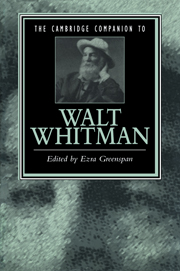Book contents
- Frontmatter
- 1 Introduction
- 2 “As If I Were With You”
- 3 Fratricide and Brotherly Love
- 4 Reading Whitman’s Postwar Poetry
- 5 Politics and Poetry
- 6 Some Remarks on the Poetics of “Participle-Loving Whitman”
- 7 “Being a Woman ... I Wish to Give My Own View”
- 8 Appearing in Print
- 9 “I Sing the Body Electric”
- 10 Walt Whitman
- 11 Borge's "Song of Myself"
- Suggestions for further reading
- Index
- Series List
5 - Politics and Poetry
Leaves of Grass and the Social Crisis of the 1850s
Published online by Cambridge University Press: 28 May 2006
- Frontmatter
- 1 Introduction
- 2 “As If I Were With You”
- 3 Fratricide and Brotherly Love
- 4 Reading Whitman’s Postwar Poetry
- 5 Politics and Poetry
- 6 Some Remarks on the Poetics of “Participle-Loving Whitman”
- 7 “Being a Woman ... I Wish to Give My Own View”
- 8 Appearing in Print
- 9 “I Sing the Body Electric”
- 10 Walt Whitman
- 11 Borge's "Song of Myself"
- Suggestions for further reading
- Index
- Series List
Summary
The subject of Whitman and politics has often been considered, but the relationship between his shifting political loyalties, his maturation as a poet, and the larger national picture has yet to be discussed in detail. Scholars such as Newton Arvin and Betsy Erkkila have made connections between Whitman's democratic poetics and the tradition of Jeffersonian and Jacksonian republicanism. Largely unexplored, however, are the significant changes in Whitman's literary voice that occurred in response to the shifting political climate of the 1846-55 period.
Many of the things we commonly associate with Whitman's poetry - its air of defiance, its radical egalitarianism, its unabashed individualism, its almost jingoistic Americanism - had been largely absent from his apprentice writings and appeared in his work only as social conditions worsened to the degree that he took on a self-appointed cultural rescue mission. “Of all nations,” he wrote in the 1855 preface to Leaves of Grass, “the United States . . . most need poets.” When he wrote these anxious words, the phrase “the United States” was virtually an oxymoron. Sectional animosities had flared up in 1850 with the congressional debates over slavery and then had exploded into full view in 1854 with the passage of the Kansas- Nebraska Act, which repealed the Missouri Compromise and opened up the western territories to slavery. The states, soon to be at war, were hardly united.
- Type
- Chapter
- Information
- The Cambridge Companion to Walt Whitman , pp. 66 - 91Publisher: Cambridge University PressPrint publication year: 1995
- 3
- Cited by



